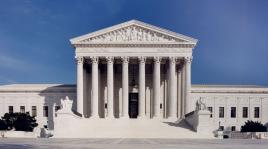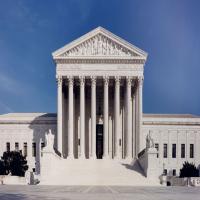Supreme Court Sets Tough Standard for Convictions on Illegitimate Prescription Charges Under CSA

The Supreme Court June 27 imposed a demanding standard of proof for the government to meet when it brings criminal charges against practitioners for allegedly dispensing or distributing controlled substances in violation of the Controlled Substances Act (CSA) (Ruan v. United States, No. 20-1410, 2022 U.S. LEXIS 3089 (U.S. June 27, 2022)).
The decision is likely to strengthen the legal positions of some physicians who have been accused of writing illicit prescriptions for opioids and other controlled substances.
The Court held that for a person to be convicted under the statute for knowingly or intentionally distributing or dispensing a controlled substance without authorization, or intending to do so, once the defendant produces evidence that he or she was authorized to dispense the controlled substance, the government must prove beyond a reasonable doubt that the defendant knowingly or intentionally acted in an unauthorized manner or intended to do so.
Issue Before the Court
The majority opinion of the Court, written by Associate Justice Stephen Breyer and joined by five other justices, addressed the question of the state of mind that is required for a conviction under 21 U.S.C. §841 for the unauthorized dispensing or distribution of controlled substances.
Under the CSA, “except as authorized” under the statute, it is unlawful “for any person knowingly or intentionally to manufacture, distribute, or dispense, or possess with intent to manufacture, distribute, or dispense, a controlled substance” (21 U.S.C. §841(a)(1)).
As stated by the Court, the issue was the following: “To prove that a doctor’s dispensation of drugs via prescription falls within the statute’s prohibition and outside the authorization exception, is it sufficient for the government to prove that a prescription was in fact not authorized, or must the government prove that the doctor knew or intended that the prescription was unauthorized?”
Facts of the Consolidated Cases
Two physicians, Dr. Xiulu Ruan and Dr. Shakeel Kahn, who both possessed licenses permitting them to prescribe controlled substances, had been convicted on charges of unlawfully dispensing and distributing controlled substances in violation of Section 841.
Ruan and a business partner were accused of writing hundreds of thousands of controlled substance prescriptions, mostly for Schedule II controlled substances, often without seeing the patients for whom the prescriptions were written. Kahn, a physician specializing in pain management, allegedly sold prescriptions for highly addictive drugs for cash. The prescriptions allegedly were frequently written without an examination of the patient or after only a perfunctory patient examination.
Physicians’ Defenses
The physicians had argued that their separate trials that their dispensing of drugs had been lawful because the drugs were dispensed pursuant to valid prescriptions. The government had argued that the prescriptions had not been issued for legitimate medical purposes by practitioners acting in the usual course of professional practice, as required under 21 C.F.R. §1306.04(a).
Importantly, at trial the physicians argued that even if the prescriptions had not met the regulation’s standard, the doctors had not knowingly or intentionally deviated from the standard.
In Ruan’s case, the district court had denied his request for a jury instruction that would require the government to prove that he subjectively knew that the prescriptions fell outside the scope of his prescribing authority. Instead, the court instructed the jury under an objective standard, asserting that a doctor violates Section 841 when his or her actions “were either not for a legitimate medical purpose or were outside the usual course of professional practice.”
Reviewing Ruan’s conviction, the U.S. Court of Appeals for the 11th Circuit held that a physician’s subjective belief that he is meeting a patient’s medical needs by prescribing a controlled substances is not a “complete defense.” Rather, it said, “whether a defendant acts in the usual course of his professional practice must be evaluated based on an objective standard, not a subjective standard” (United States v. Ruan, 966 F.3d 1101 (11th Cir. 2020)).
Before Kahn’s conviction, the district court had instructed the jury that it should not convict if the physician had acted in “good faith” — i.e., in an attempt “to act in accordance with what a reasonable physician should believe to be proper medical practice.” To find such “good faith,” the court also said, the jury would have to conclude that he had “acted in an honest effort to prescribe for patients’ medical conditions in accordance with generally recognized and accepted standards of practice.”
“Good faith” would be a “complete defense,” the court told the Kahn jury, because it “would be inconsistent with knowingly and intentionally distributing and/or dispensing controlled substances outside the usual course of professional practice and without a legitimate medical purpose.”
Reviewing Kahn’s conviction, the U.S. Court of Appeals for the 10th Circuit affirmed, holding that to convict under Section 841 the government most prove that the doctor “either: (1) subjectively knew a prescription was issued not for a legitimate medical purpose; or (2) issued a prescription that was objectively not in the usual course of professional practice” (United States v. Kahn, 989 F.3d 806 (10th Cir. 2021)).
The Supreme Court decided to review cases, which it consolidated to determine what state of mind applies to the Section 841’s exception for “authorized” acts.
Interpreting the Statute
In reaching its decision, the Court majority determined that Section 841’s requirement for a knowing or intentional state of mind applies to the statute’s “except as authorized” phrase.
Consequently, the Court said, “once a defendant meets the burden of producing evidence that his or her conduct was ‘authorized,’ the government must prove beyond a reasonable doubt that the defendant knowingly or intentionally acted in an unauthorized manner.”
The Court based its determination on a number of factors, including the following:
- In Section 841 prosecutions, “it is the fact that the doctor issued an unauthorized prescription that renders his or her conduct wrongful, not the fact of the dispensing itself. … Authorizations plays a crucial role in separating innocent conduct — and, in the case of doctors, socially beneficial conduct — from wrongful conduct.”
- The language of 21 C.F.R. §1306.04(a) defining an authorized prescription is “ambiguous, written in generalities, susceptible to more precise definition and open to varying constructions” (Gonzales v. Oregon, 546 U.S. 243 (2006)). The conduct prohibited by that language “is thus often difficult to distinguish from the gray zone of socially acceptable conduct.”
- Section 841 imposes severe penalties upon those who violate it — incarceration for as much as a life term and fines of up to $1 million. “Such severe penalties counsel in favor of a strong scienter requirement,” the Court said — i.e., a strong requirement that the defendant knows that the act is wrongful and intends to act despite this knowledge.
Rejecting the Government’s Interpretation
The government had interpreted the statute to mean that it could convict “by proving beyond a reasonable doubt that [the defendant] did not even make an objectively reasonable attempt to ascertain and act within the bounds of professional medicine.”
However, the Court noted, the statute “uses the familiar mens rea [(intention of wrongdoing)] words ‘knowingly or intentionally.’ It nowhere uses words such as ‘good faith,’ ‘objectively,’ ‘reasonable,’ or ‘honest effort.’”
“Moreover,” the Court continued, “the government’s standard would turn a defendant’s criminal liability on the mental state of a hypothetical ‘reasonable’ doctor, not on the mental state of the defendant himself or herself. We have rejected analogous suggestions in other criminal contexts.”
Also, the government had argued that requiring it to prove that a doctor knowingly or intentionally acted in an unauthorized way “will allow bad-apple doctors to escape liability by claiming idiosyncratic views about their prescribing authority,” the Court noted.
“The government, of course, can prove knowledge of a lack of authorization through circumstantial evidence,” the Court continued. “And the regulation defining the scope of a doctor’s prescribing authority does so by reference to objective criteria such as ‘legitimate medical purpose’ and ‘usual course’ of ‘professional practice.’ … The more unreasonable a defendant’s asserted beliefs or misunderstandings are, especially as measured against objective criteria, the more likely the jury will find that the government has carried its burden of proving knowledge.”
“But the government must still carry this burden,” the Court stressed. “And for purposes of a criminal conviction under Section 841, this requires proving that a defendant knew or intended that his or her conduct was unauthorized.”
Remands Ordered
Rejecting the government’s arguments, the Court vacated the judgments by the two courts of appeals and remanded the two physicians’ cases for further proceedings.
“The court of appeals in both cases evaluated the jury’s instructions under an incorrect understanding of Section 841’s scienter requirements,” the Court said. “We decline to decide in the first instance whether the instructions complied with the standard we have set today. We leave that and any harmlessness questions for the courts to address on remand.”
Concurring Opinion
In a separate opinion concurring in the Court’s judgment, Associate Justice Samuel Alito, joined by Associate Justice Clarence Thomas and Associate Justice Amy Coney Barrett, disagreed with the majority opinion, concluding that “absolutely nothing in the text of the [CSA] indicates that Congress intended to impose a burden on the government to disprove all assertions of authorization beyond a reasonable doubt.”
Alito said that he would have held that the CSA contains an exception for prescriptions issued in the course of professional practice — a carry-over from the CSA’s processor. He noted that in a 1925 case interpreting the predecessor statute, the Court had held that a registered physician acts in the course of professional practice when he or she writes prescriptions in good faith (Linder v. United States, 268 U.S. 5 (1925)).
“I would hold that this rule applies under the CSA and would therefore vacate the judgments below and remand for further proceedings,” Alito said.



